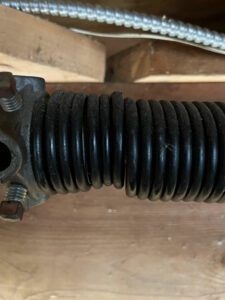
Why Garage Door Springs Break and What to Do About It
Why Garage Door Springs Break and What to Do About It Garage door springs are essential components that make lifting and lowering your garage door smooth and effortless. However, like any mechanical part, they don’t last forever. When a garage door spring breaks, it can be inconvenient, dangerous, and costly. Understanding why these springs fail and knowing what steps to take can help you prevent unexpected breakdowns. If you’re searching for professional garage door spring repair, this guide will provide the insights you need.
Common Reasons Garage Door Springs Break
1. Wear and Tear
Garage door springs have a limited lifespan, typically rated for about 10,000 cycles (one cycle equals opening and closing the door once). Over time, the metal weakens, making the springs more likely to snap. Regular maintenance can help extend their longevity.
2. Rust and Corrosion
Rust can weaken the metal in your springs, causing them to deteriorate faster. Moisture, humidity, and lack of lubrication contribute to this issue. Applying a silicone-based lubricant regularly can help prevent rust buildup.
3. Poor Maintenance
Routine maintenance, such as checking for frayed cables, ensuring proper tension, and lubricating moving parts, plays a vital role in prolonging the life of your garage door springs. Neglecting these steps can lead to premature failure.
4. Temperature Changes
Extreme temperature fluctuations can cause metal to expand and contract, leading to stress fractures in the springs. This is especially common in regions with harsh winters or scorching summers.
5. Imbalanced Garage Door
If your garage door is not balanced correctly, the springs will have to work harder to lift it, putting extra strain on them. An imbalanced door can also cause uneven wear, leading to premature breakage.
What to Do If Your Garage Door Springs Break
A broken garage door spring can leave your door stuck in place or cause it to slam shut unexpectedly. Here’s what you should do:
1. Stop Using the Garage Door
Continuing to use a garage door with a broken spring can cause further damage to the opener and cables. It’s best to leave the door as is and avoid forcing it open.
2. Do Not Attempt DIY Repairs
Garage door springs are under high tension and can be extremely dangerous to replace without the proper tools and experience. DIY repairs can lead to injury or further damage to your garage door system.
3. Contact a Professional
The safest and most effective way to handle a broken spring is to call a garage door repair expert. They have the necessary experience and tools to replace the springs safely and efficiently.
4. Schedule Regular Maintenance
Prevent future issues by scheduling routine maintenance checks. A professional can inspect your springs, lubricate moving parts, and adjust tension to keep your garage door functioning smoothly.
Trust Eppler Garage Doors for Reliable Spring Repairs
A broken garage door spring can be a major inconvenience, but with the right knowledge and professional help, you can get your door back in working order quickly. At Eppler Garage Doors, we specialize in high-quality garage door spring repair and maintenance to keep your system running safely and efficiently. If you need reliable garage door spring repair, contact us today for expert service!


